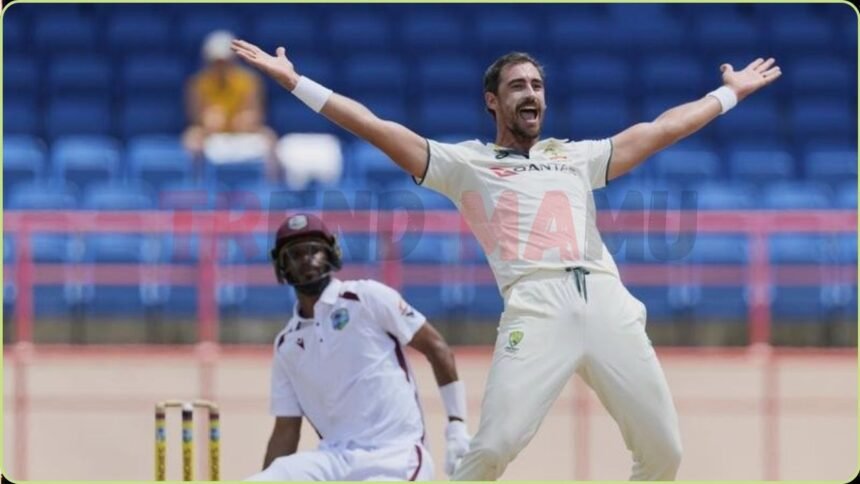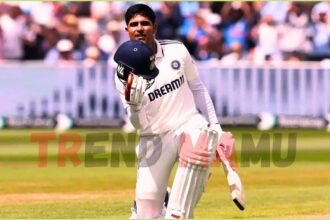Starc Crushes West Indies Record-Breaking Five-For in Test History.
On July 14, 2025, Mitchell Starc delivered a masterclass in fast bowling, claiming the fastest five-wicket haul in Test history in just 15 balls, as Australia demolished the West Indies by 176 runs in the third Test at Sabina Park, Jamaica.
The 3-0 series sweep was sealed with a performance that left the hosts reeling at 27 all out—the second-lowest total in Test cricket history. Starc’s fiery spell, coupled with Scott Boland’s hat-trick, turned a competitive chase of 204 into a batting collapse for the ages.
This article dives into the chaos of Kingston, Starc’s historic milestone, and what this means for both teams.
Starc’s Record-Breaking Rampage
Mitchell Starc, playing his 100th Test, unleashed a devastating opening spell that redefined Test cricket history. Bowling with the pink ball under lights, he dismantled the West Indies’ top order in a mere 15 deliveries, surpassing the previous record for the fastest five-wicket haul held by Ernie Toshack (1947), Stuart Broad (2015), and Scott Boland (2021), who each needed 19 balls.
Starc’s figures of 6-9, his career-best, were a testament to his relentless pace and swing, earning him Player of the Match and Series honors with 15 wickets at 14.80.
The carnage began with the first ball of West Indies’ second innings, as John Campbell edged an outswinger to substitute wicketkeeper Josh Inglis, standing in for the concussed Alex Carey. Four balls later, debutant Kevlon Anderson was plumb lbw to a vicious inswinger, inexplicably reviewing the decision.
Brandon King fell next, driving at a ball that crashed through the gate to hit his stumps, leaving West Indies at 0-3 after one over. Starc’s fourth wicket, Mikyle Louis, marked his 400th Test scalp, making him only the fourth Australian to reach the milestone after Shane Warne, Glenn McGrath, and Nathan Lyon.
Two balls later, Shai Hope was trapped lbw, completing the historic five-for in 2.3 overs with figures of 2-2-5 at that point.
Boland’s Hat-Trick and West Indies’ Collapse
At tea, West Indies were 22-6, just four runs shy of equaling New Zealand’s record-low Test total of 26 from 1955. Josh Hazlewood added to the misery by dismissing captain Roston Chase, caught behind, but it was Scott Boland who stole the spotlight post-tea.
In the 14th over, Boland claimed a hat-trick—only the 10th by an Australian in Test history—dismissing Justin Greaves (caught at slip), Shamar Joseph (lbw), and Jomel Warrican (bowled through the gate). West Indies slumped to 26-9, teetering on the edge of infamy.
A misfield by Sam Konstas at gully allowed a single, sparing West Indies the lowest-ever total, but Starc sealed the rout by bowling Jayden Seales, finishing the innings at 27 in 14.3 overs, the third-shortest all-out innings in Test history with a record seven ducks.
West Indies’ collapse was staggering. Only Greaves (11) reached double figures, with leg byes (6) as the second-highest scorer. The top six batters collectively scored just six runs, the lowest ever in a Test innings.
The match’s 516 total runs across four innings marked it as the seventh-lowest-scoring Test since 1910, with no batter managing a fifty—a rare feat occurring only 16 times in Test history.
Australia’s Batting Struggles and West Indies’ Fight
Australia’s second innings of 121, their lowest against West Indies since 1995, set the stage for the chase. Alzarri Joseph (5-27) and Shamar Joseph (4-34) exploited the bowler-friendly conditions, with Cameron Green’s 42 the top score.
Earlier, both teams’ first innings were competitive—Australia 225 (Steve Smith 48, Green 46) and West Indies 143 (John Campbell 36)—but the pink-ball conditions amplified the bowlers’ dominance.
Despite their batting collapse, West Indies’ pacers showed fight, with Shamar Joseph’s 4-33 in Australia’s first innings and Alzarri’s heroics keeping them in the game until day three’s meltdown.
Roston Chase, in his debut series as captain, called the defeat “heartbreaking” and “embarrassing,” lamenting recurring batting failures. “We thought we could win, but this poor display let us down,” he told ESPN, with coach Daren Sammy facing scrutiny, as former player Carl Hooper called for his sacking.
Starc’s Milestone and Australia’s Dominance
Starc’s 400th wicket, achieved in his 100th Test, cemented his legacy as one of Australia’s greatest fast bowlers. At 35, his pace remains undiminished, averaging 145 kph, and his mastery of the pink ball—where he has 80 wickets at 17.65—proved lethal.
Captain Pat Cummins praised Starc’s “resilience, skill, and fitness,” while Boland lauded his teammate’s “unbelievable” opening spell. The series sweep strengthens Australia’s position in the 2025-27 World Test Championship cycle, with their pace attack—Starc, Cummins, Hazlewood, and Boland—proving unstoppable.
However, the series exposed vulnerabilities in Australia’s batting. Sam Konstas, the 19-year-old opener, struggled with 50 runs at 8.33 and dropped catches, raising questions about his readiness for the upcoming Ashes.
Steve Smith (127 runs at 31.75) and Green (224 at 37.33) were the only consistent performers, highlighting concerns about the top order on bowler-friendly pitches.
Looking Ahead: T20 Series and Beyond
The teams now shift to a five-match T20 series starting July 21 in Jamaica, where West Indies will aim to salvage pride. For Australia, the focus turns to the Ashes, with Starc and Boland’s performances setting a high bar.
West Indies face a rebuilding challenge, with their batting frailties exposed and leadership under pressure. Yet, some fans expressed sympathy for West Indies, noting, “This was brutal, but their bowlers showed fight.”
Starc’s historic blitz and Boland’s hat-trick will be etched in cricket lore, but the West Indies’ collapse underscores the gulf between the teams. As Australia celebrates a dominant 3-0 sweep, the Caribbean side must regroup to avoid further ignominy.









